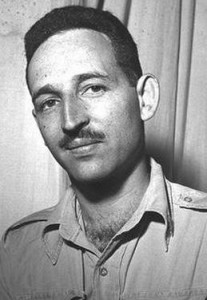Israel’s Legendary Commando
 Moshe “Muki” Betser (b. 1945) was born in the moshav of Nahalal in the north of Israel, the grandson of the founders of Degania Alef, Israel’s first kibbutz. He fought valiantly as a young soldier in the Six-Day War, and remained in the military thereafter. Soon, he became a commando in Israel’s elite Sayeret Matkal special forces unit. In 1971, after repeated terrorist attacks coming from Lebanon, Betser and his unit launched a cross-border raid into the town of El-Khyam, killing at least 10 terrorists and blowing up two terrorist bases. Despite the loss of fellow commando Lt. Dov Adar, all of the mission’s objectives were achieved. During the Yom Kippur War, Betser defended the Golan Heights. He then co-founded another special forces unit, Shaldag (now a division of the Israeli Air Force). That same year, Betser led another raid into Lebanon. In a daring night-time mission, his unit quietly entered Beirut from the sea, and eliminated three unsuspecting PLO terror leaders to retaliate for the 1972 Munich Olympics massacre. The following year, on the anniversary of Israel’s declaration of independence, three Palestinians terrorists took 115 Israeli hostages at a school in the town of Ma’alot. Betser led one of the teams in the rescue mission which, unfortunately, did not go as planned. While the three terrorists were ultimately killed, they managed to tragically take the lives of 22 students and 3 teachers first. For Betser, this experience was especially traumatic, but taught him important lessons that he implemented while commanding Operation Thunderbolt—the famous rescue of hostages in Entebbe, Uganda—two years later. Betser planned most of the mission, and was credited with ensuring its success. In fact, he was so instrumental because, several years prior, he had actually gone to Uganda to train their military! Betser continued to serve in the military until his retirement in 1986, with the rank of colonel. Since then, he has worked as a city planner and real estate developer, and co-founded the Galilean towns of Neve Ziv and Tamar (where he still lives). In 2005, he also co-founded a pre-military training school, where he continues to play a key leadership role. Betser has been called “one of Israel’s most legendary commandos”.
Moshe “Muki” Betser (b. 1945) was born in the moshav of Nahalal in the north of Israel, the grandson of the founders of Degania Alef, Israel’s first kibbutz. He fought valiantly as a young soldier in the Six-Day War, and remained in the military thereafter. Soon, he became a commando in Israel’s elite Sayeret Matkal special forces unit. In 1971, after repeated terrorist attacks coming from Lebanon, Betser and his unit launched a cross-border raid into the town of El-Khyam, killing at least 10 terrorists and blowing up two terrorist bases. Despite the loss of fellow commando Lt. Dov Adar, all of the mission’s objectives were achieved. During the Yom Kippur War, Betser defended the Golan Heights. He then co-founded another special forces unit, Shaldag (now a division of the Israeli Air Force). That same year, Betser led another raid into Lebanon. In a daring night-time mission, his unit quietly entered Beirut from the sea, and eliminated three unsuspecting PLO terror leaders to retaliate for the 1972 Munich Olympics massacre. The following year, on the anniversary of Israel’s declaration of independence, three Palestinians terrorists took 115 Israeli hostages at a school in the town of Ma’alot. Betser led one of the teams in the rescue mission which, unfortunately, did not go as planned. While the three terrorists were ultimately killed, they managed to tragically take the lives of 22 students and 3 teachers first. For Betser, this experience was especially traumatic, but taught him important lessons that he implemented while commanding Operation Thunderbolt—the famous rescue of hostages in Entebbe, Uganda—two years later. Betser planned most of the mission, and was credited with ensuring its success. In fact, he was so instrumental because, several years prior, he had actually gone to Uganda to train their military! Betser continued to serve in the military until his retirement in 1986, with the rank of colonel. Since then, he has worked as a city planner and real estate developer, and co-founded the Galilean towns of Neve Ziv and Tamar (where he still lives). In 2005, he also co-founded a pre-military training school, where he continues to play a key leadership role. Betser has been called “one of Israel’s most legendary commandos”.
Happy 75th Birthday to Israel!
15 Wise Sayings of Hillel the Elder
Words of the Week
I had faith in Israel before it was established, I have in it now. I believe it has a glorious future before it – not just another sovereign nation, but as an embodiment of the great ideals of our civilization.
– President Harry Truman


